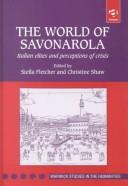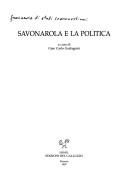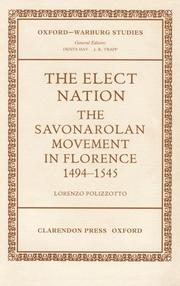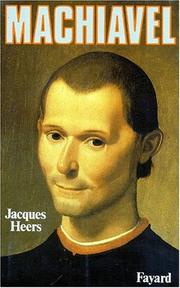| Listing 1 - 10 of 24 | << page >> |
Sort by
|
Book
ISBN: 9780198815457 019881545X Year: 2018 Publisher: Oxford Oxford university press
Abstract | Keywords | Export | Availability | Bookmark
 Loading...
Loading...Choose an application
- Reference Manager
- EndNote
- RefWorks (Direct export to RefWorks)
An important new interpretation of Machiavelli's political thinking, appearing in English for the first time. Constituting Freedom focuses on the question at the heart of Machiavelli's thinking, that is 'in what mode a free state, if there is one, can be maintained in corrupt cities; or, if there is not, in what mode to order it?' The book analyses the different solutions thought up by Machiavelli, starting from the hypothesis of the 'civil principality', the definition of the republican ' civil and free way of life' and the examination of the history of the Florentine institutions, to two short writings during the years 1520-1522, the Discursus florentinarum rerum and the Minuta di provisione per la riforma dello Stato di Firenze, in which Machiavelli explored publicly, for the first time, his projects to bring back the republican freedom in Florence after the fall of the first Republic of the City and the Medici's return. The book's main argument is that Machiavelli was always a committed republican, even when he worked for the Medici, and even though he believed that the city's constitution needed to change after the fall of Soderini. In the Discursus and in the Minuta Machiavelli proposed a constitution in which the 'humours' were forced to mix themselves with one another so as to be obliged to generate a new form of 'equality', which according to Machiavelli is the main characteristic of a free, just, and stable republic. The aim was not to obtain equilibrium among parts of the city leaving them unaltered, but to mix them. Only in this way could Florence return to being free.
Book
ISSN: 00694290 ISBN: 2713220726 9782713220722 Year: 2006 Volume: 123
Abstract | Keywords | Export | Availability | Bookmark
 Loading...
Loading...Choose an application
- Reference Manager
- EndNote
- RefWorks (Direct export to RefWorks)
Power (Social sciences) --- Pouvoir (Sciences sociales) --- History. --- Histoire --- Florence (Italy) --- Florence (Italie) --- History --- Politics and government --- Administration --- Politique et gouvernement --- Florence (Italy) - History - To 1421 --- Florence (Italy) - History - 1421-1737 --- Florence (Italy) - Politics and government - To 1421 --- Florence (Italy) - Politics and government - 1421-1737

ISBN: 0754602508 9780754602507 Year: 2000 Volume: *1 Publisher: Aldershot ; Burlington Ashgate
Abstract | Keywords | Export | Availability | Bookmark
 Loading...
Loading...Choose an application
- Reference Manager
- EndNote
- RefWorks (Direct export to RefWorks)
Piagnoni (Savonarolan movement) --- Savonarola, Girolamo, - 1452-1498 - Influence - Congresses. --- Savonarola, Girolamo, - 1452-1498 - Political and social views - Congresses. --- Piagnoni (Savonarolan movement) - Congresses. --- Florence (Italy) - Politics and government - 1421-1737 - Congresses.

ISBN: 8887027129 9788887027129 Year: 1997 Volume: 2 Publisher: Firenze : SISMeL [Società Internazionale per lo Studio del Medioevo Latino] / Edizioni del Galluzzo,
Abstract | Keywords | Export | Availability | Bookmark
 Loading...
Loading...Choose an application
- Reference Manager
- EndNote
- RefWorks (Direct export to RefWorks)
Savonarola, Girolamo, --- Florence (Italy) --- Politics and government --- Church history --- Savonarola, Girolamo, - 1452-1498 - Congresses --- Florence (Italy) - Politics and government - 1421-1737 - Congresses --- Florence (Italy) - Church history - Congresses --- Savonarola, Girolamo, - 1452-1498
Book
ISBN: 1108563791 1316410773 1108675581 1107125502 9781107181717 9781107125506 1107181712 9781108675581 9781316410776 1107565103 9781107565104 9781107565104 Year: 2018 Publisher: Cambridge, United Kingdom New York
Abstract | Keywords | Export | Availability | Bookmark
 Loading...
Loading...Choose an application
- Reference Manager
- EndNote
- RefWorks (Direct export to RefWorks)
What do modern republics have to fear? Machiavelli's Florentine Republic reconstructs Machiavelli's answer to this question from the perspective of the Florentine Histories, his most probing meditation on the fate of republican politics in the modern age. It argues that his principle goal in narrating the defeat of Florentine republicanism is to debunk the views of leading humanists concerning the overall health of republican politics in modernity and the distinctive challenges that modern republics should expect to face. The Medici family had exposed these vulnerabilities better than anyone else, and Machiavelli reconstructs their political strategy to show how conventional ideas of moral and political virtue are the most potent instruments of princely ambition in a city that wants to be free.
Republicanism --- Political science --- History --- Machiavelli, Niccolò, --- Florence (Italy) --- Politics and government --- Republicanism - Italy - Florence - History - 16th century --- Machiavelli, Niccolò, - 1469-1527. - Istorie fiorentine --- Florence (Italy) - Politics and government - 1421-1737

ISBN: 0199206007 9780199206001 Year: 1994 Volume: *16 Publisher: Oxford New York Clarendon Press Oxford University Press
Abstract | Keywords | Export | Availability | Bookmark
 Loading...
Loading...Choose an application
- Reference Manager
- EndNote
- RefWorks (Direct export to RefWorks)
Huilers (Beweging van Savonarolan) --- Paignoni (Mouvement de Savonarolan) --- Piagnoni (Beweging van Savonarolan) --- Piagnoni (Savonarolan movement) --- Pleureurs (Mouvement de Savonarolan) --- Schreiers (Beweging van Savonarolan) --- Weepers (Savonarolan movement) --- Savonarola, Girolamo, --- Political and social views --- Influence --- Florence (Italy) --- Politics and government --- Savonarola, Girolamo Maria Francesco Matteo --- 1421-1737 --- Savonarola, Girolamo, - 1452-1498 - Political and social views. --- Savonarola, Girolamo, - 1452-1498 - Influence. --- Florence (Italy) - Politics and government - 1421-1737. --- Savonarola, Girolamo, - 1452-1498 - Political and social views --- Savonarola, Girolamo, - 1452-1498 - Influence --- Florence (Italy) - Politics and government - 1421-1737 --- Savonarola, Girolamo, - 1452-1498
Book
ISBN: 9782503523897 2503523897 Year: 2007 Volume: 12 Publisher: Turnhout Brepols
Abstract | Keywords | Export | Availability | Bookmark
 Loading...
Loading...Choose an application
- Reference Manager
- EndNote
- RefWorks (Direct export to RefWorks)
History of Italy --- anno 1400-1499 --- Florence --- Exile (Punishment) --- Bannissement --- History. --- Histoire --- Florence (Italy) --- Florence (Italie) --- Politics and government --- Administration --- Politique et gouvernement --- Exiles --- Citizenship --- History --- Italy --- To 1500 --- Jusqu'à 1421 --- 1421-1737 --- Exile (Punishment) - Italy - Florence - History - To 1500. --- Exiles - Italy - Florence - History - To 1500. --- Citizenship - Italy - Florence - History - To 1500. --- Florence (Italy) - Politics and government - To 1421. --- 14e siècle --- 15e siècle

ISBN: 2213015783 9782213015781 Year: 1985 Publisher: Paris : Arthème Fayard,
Abstract | Keywords | Export | Availability | Bookmark
 Loading...
Loading...Choose an application
- Reference Manager
- EndNote
- RefWorks (Direct export to RefWorks)
Statesmen --- Intellectuals --- Authors, Italian --- Hommes d'Etat --- Intellectuels --- Ecrivains italiens --- Biography --- Biographies --- Biographie --- Machiavelli, Niccolò, --- Florence (Italy) --- Florence (Italie) --- Politics and government --- Politique et gouvernement --- Hommes d'État --- Écrivains italiens --- Machiavel, --- Machiavelli, Niccolò, --- Biographie. --- Machiavel --- Statesmen - Italy - Florence - Biography --- Intellectuals - Italy - Florence - Biography --- Authors, Italian - 16th century - Biography --- Machiavelli, Niccolò, - 1469-1527. --- Florence (Italy) - Politics and government - 1421-1737 --- Florence (Italy) - Biography
Book
ISBN: 9782729838430 2729838430 Year: 2008 Publisher: Paris Ellipses
Abstract | Keywords | Export | Availability | Bookmark
 Loading...
Loading...Choose an application
- Reference Manager
- EndNote
- RefWorks (Direct export to RefWorks)
Statesmen --- Intellectuals --- Hommes d'Etat --- Intellectuels --- Biography. --- Biographies --- Biographie --- Machiavelli, Niccolò, --- Criticism and interpretation --- Florence (Italy) --- Florence (Italie) --- Politics and government --- Politique et gouvernement --- Machiavelli, Niccolò, --- Criticism and interpretation. --- Statesmen - Italy - Florence - Biography --- Intellectuals - Italy - Florence - Biography --- Machiavelli, Niccolò, - 1469-1527 --- Florence (Italy) - Politics and government - 1421-1737
Book
ISBN: 9782600018197 2600018190 Year: 2015 Volume: 125 Publisher: Genève Droz
Abstract | Keywords | Export | Availability | Bookmark
 Loading...
Loading...Choose an application
- Reference Manager
- EndNote
- RefWorks (Direct export to RefWorks)
Après la révolte des Ciompi en 1378, la société florentine, pour qui la compétence politique est un savoir transmis de père en fils, a élaboré un ordre des générations qui exalte la sagesse des vieillards et écarte les jeunes gens de la scène politique. A la fin du siècle suivant, le dominicain Jérôme Savonarole explique aux Florentins que pour échapper aux fléaux divins incarnés par l’armée française de Charles VIII, ils doivent se détourner du modèle constitué par leurs ancêtres et imiter leurs enfants, qui ont compris le projet moral et politique de Dieu pour la cité. Sa prédication bouleverse suffisamment la hiérarchie des âges de la vie pour que la génération de la guerre, formée à la vie politique après 1494, voie dans les jeunes gens les médecins d’une cité que leurs aînés ont rendue malade par leur incapacité à s’adapter aux circonstances, leur sélection erronée des dirigeants et leur refus de confier les armes aux citoyens. Entre 1527 et 1530, le salut de la cité leur sera même confié.
Political science --- Families --- History --- Florence (Italy) --- Politics and government --- Famille --- Generations --- Générations --- Idées politiques --- Florence (Italie) --- Politique et gouvernement --- Political science - Italy - Florence - History --- Families - Italy - Florence - History --- Florence (Italy) - Politics and government - 1421-1737 --- Générations --- Idées politiques
| Listing 1 - 10 of 24 | << page >> |
Sort by
|

 Search
Search Feedback
Feedback About UniCat
About UniCat  Help
Help News
News